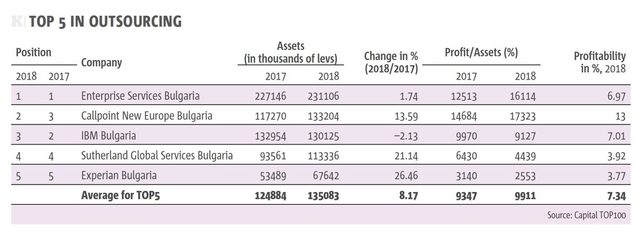- 11 000 people are employed by the leaders and their teams grow out to Plovdiv, Varna, and Burgas, as well as other regional capitals like Veliko Tarnovo and Ruse
The shared services sector has grown intensively over the last several years and has long moved on from so-called call centres, which were its initial phase. Nearly all companies in the industry have increased their revenue and employees, while the sector itself accounts for about 4.8% of Bulgaria's GDP. The Bulgarian Outsourcing Association (BAA) expects that the combined revenue of about 500 companies in the industry will double to reach four billion euro by 2021 and constitute 7.9% of GDP. The industry can be divided into two main sectors - business process outsourcing (BPO) and IT outsourcing (ITO). Representatives of the latter like Bulpros and Scale Focus are mostly present in Capital´s ranking of IT companies because this is their main activity. BPO companies still generate most of the industry's revenue, but the ITOs are increasingly profitable. It is worth noting that the lines between segments are rather blurred due to the growing complexity of the services offered. Another characteristic is the continuing opening of offices away from Sofia. Over the past few years a number of companies launched centers in Plovdiv, Varna and Burgas and continue their expansion in other regional centers such as Ruse and Veliko Tarnovo.
The Top 5 in Capital´s ranking of outsourcing companies employed a total of 11 000 people last year, or about 7% more compared with 2017. The revenue of the industry leaders grew by 50 million levs, a slightly lower increase compared with 2017, to reach a total of 675 million levs. All five companies are part of large multinational groups and use and develop their know-how and procedures in Bulgaria. The new old leader
For the second year in a row, the number one spot is taken by Enterprise Services Bulgaria. The company was created two years ago and is the de facto heir to the longtime industry leader Hewlett Packard Global Delivery Bulgaria. It was born out of the global merger between Hewlett Packard Enterprises and Computer Sciences Corp. in 2016 and led to the creation of the new company DXC Technology. Even before the transaction, the two companies had large engineering departments in Bulgaria. After the completion of the deal, Enterprise Services Bulgaria and the DXC Technology Bulgaria (formerly CSC Bulgaria) began work with about 450 employees. The latter is included in Capital's IT ranking. Enterprise Services Bulgaria's business is once again in the realm of IT support and other services like tech infrastructure management, business reports. Most of the company's clients are from German-speaking countries, but it also works with corporate partners in the US, the UK and Scandinavia. In 2018, Enterprise Services Bulgaria's revenue has risen slightly, as the business remained stable. There was a small decrease in the number of employees, but it remains above 3100. Ever bigger
Callpoint New Europe has climbed one position in the chart and is second with a revenue rise of 13.5% to 133 million levs. The company is known as TELUS International Europe, part of Canadian telecommunication giant TELUS, which purchased it in 2012. In recent years the company has been expanding its business continuously and has moved part of its team to a new building. At the moment, it has about 3000 employees in Sofia and Plovdiv. It works with clients from different countries and over 20 languages, including Google and Facebook. The association with the social media giant started at the beginning of this year when a content moderating center opened. The office is managed by TELUS International Europe and the plan is for its staff to reach 150 people. According to TELUS International's managing director Jeffrey Puritt, the company plans to be employing a total of 5000 people within the next two years, which will make it the largest in the sector. Callpoint New Europe is the most profitable business in the outsourcing companies' ranking with a profit of 17.3 million levs and a net margin of 13%. Third spot is occupied by the only company whose revenue has dropped slightly. IBM Bulgaria runs a few outsourced service centers in the country, which mostly cover financial, IT and customer support services in 15 languages. The Bulgarian team also includes IBM's commercial office here. Last year, the total number of employees decreased by 6% and now stands at 1815 people. The reason is that some of the company's projects were relocated to other offices. The revenue was 130 million levs.
Fourth is the company with the most dynamic employee growth in this year's ranking. Sutherland Global Services Bulgaria has five offices - in Sofia, Burgas and Varna, with a staff of over 2500 (mid-2019 data). In the past year, its workforce increased by 33%. Revenue grew as well, by 21% to 113 million levs. The company, part of the Sutherland global group, offers customer services in a number of languages and IT services for large corporations. Global giants like Spotify are among its clients. In recent years the company pursued a sizeable expansion of its activities outside Sofia. In Burgas, for example, the company has an office with over 300 staff who mainly work in German. The fifth company in the ranking is a new participant that has enjoyed continuous growth since it entered Bulgaria in 2004. Experian Bulgaria is part of the Experian global group, which offers financial services, software development and other services to clients like American Express, Barclays, Yahoo!, Hilton, to name just a few. Its workforce in Bulgaria grew by 20% to 850 in 2018, while it currently has 950 employees. The company also moved into a new office building this year with capacity for 1200 workplaces.
Growth, but in terms of expertise and coverage
The outsourcing industry occupies an ever-growing share of the Bulgarian labour market and now employs over 3% of the entire workforce. Expectations are that it will continue to recruit new hires and diversify its expertise. According to the chairman of the Bulgarian Outsourcing Association and CEO of Bulpros, Ivaylo Slavov, the sector is much more than the call centres - the actual share of telephone services in the industry is under 16%. It is a positive development that a growing number of international companies also want to expand to cities other than Sofia, where they believe they can find the necessary personnel. The industry is undergoing a transformation that will see a continuous increase in the share of business with a more substantial added value.

- 11 000 people are employed by the leaders and their teams grow out to Plovdiv, Varna, and Burgas, as well as other regional capitals like Veliko Tarnovo and Ruse
The shared services sector has grown intensively over the last several years and has long moved on from so-called call centres, which were its initial phase. Nearly all companies in the industry have increased their revenue and employees, while the sector itself accounts for about 4.8% of Bulgaria's GDP. The Bulgarian Outsourcing Association (BAA) expects that the combined revenue of about 500 companies in the industry will double to reach four billion euro by 2021 and constitute 7.9% of GDP. The industry can be divided into two main sectors - business process outsourcing (BPO) and IT outsourcing (ITO). Representatives of the latter like Bulpros and Scale Focus are mostly present in Capital´s ranking of IT companies because this is their main activity. BPO companies still generate most of the industry's revenue, but the ITOs are increasingly profitable. It is worth noting that the lines between segments are rather blurred due to the growing complexity of the services offered. Another characteristic is the continuing opening of offices away from Sofia. Over the past few years a number of companies launched centers in Plovdiv, Varna and Burgas and continue their expansion in other regional centers such as Ruse and Veliko Tarnovo.












